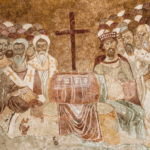“Marriage” is more than a word. It’s also a concept, and a spiritual symbol. If we tinker with its meaning we are likely to surrender more than we realise.

Christians who seek to persuade their fellow believers to abstain or vote “yes” in the current postal poll sometimes stress how significant the symbolism is for gay people. They have been rejected by society, bullied and marginalised; changing this symbol will be a clear statement that we don’t want to perpetuate that toxic rejection.
Another aspect of this is nature of words themselves. Surely they are social realities? If enough people think “marriage” means “committed romantic relationship” that’s what it means for the society that those people comprise. How can you disprove a convention? Who are Christians to say different?
These arguments have a logic and strength to them. And yet “marriage” is more than a word—more than a bare signifier. It’s also a concept, a social reality and—in the light of the Bible—a spiritual symbol. If we tinker with its meaning we are likely to surrender more than we realise.
Here are two brief attempts to illustrate the point: one from a secular perspective and one from a Christian point of view.
1. A Secular Argument Against Changing the Meaning of “Marriage”
“Marriage”, until very recent times has always connoted heterosexuality. This doesn’t mean (please read carefully): marriage arrangements have always taken the same form; or that every heterosexual coupling has been a marriage; or that marriage relationships have been happy; or that heterosexual relationships have been better than homosexual relationships. It just means that marriage has always had the union of a man and woman at its core. “Marriage” has been a word, a concept and a reality reserved for that basic type of relationship.
And surely we can see the logic of that. “Marriage” as a social institution concentrates on heterosexuality because heterosexual union is what produces new members of society. Communities that want their citizens to flourish seek to stabilise and regulate the unions that produce those citizens.
When we see it that way, we immediately see how connecting marriage to (biological) sex is different from racist prohibitions against mixed marriage. Race is entirely incidental to marriage—it wouldn’t matter if nobody ever married from within their ethnic group again. But without heterosexual relationships a civilisation would simply cease to exist. If heterosexuality is the garden bed that enables humanity to bear fruit; marriage is the fence that protects that garden so it can go on remaining fruitful.
Again note what I am not saying here. I am not saying that having children is the only thing that makes heterosexual relations special. Nor am I denying that heterosexual couples have things in common with same-sex couples. But I am saying is that childbearing is one major reason why societies want to promote marriage.
Other societies, anyway. In the decadent West, the growth of individualism, careerism, cohabitation and easy divorce have all weakened this social dimension of marriage. For many couples, marriage has become little more than an optional extra—a public celebration of an existing relationship that will succeed or fail regardless of the institution. Marriage isn’t about society trying to stabilise heterosexual unions for the general good—it’s about acknowledging the feelings of the people involved in it.
On this modern reinterpretation, it’s hard to object to same-sex marriage—except to point out that this latest change will complete the trend. If we change the definition of marriage we will be declaring once-and-for-all that the essence of marriage is sentiment. We will be turning the fence that once guarded heterosexual relations into a signpost. And there’s nothing wrong with a signpost—except that it doesn’t do much to protect your garden.
My argument, in sum, to this point, is that changing the definition will make marriage less significant—that is, less of a social reality—and that, accordingly, it is likely to further destabilise the family unit.[1] I realise that some people—those particularly high on individualism—might have trouble caring about the fate of “society”. Others might think that it’s simply too late to change our course. And radical idealogues might even welcome that change. But people who care about the kind of world that their children will inherit should worry. Less stable families generally means less stable citizens.
2. A Christian Argument Against Changing the Meaning of “Marriage”
Christians, however, have extra reasons to care about the meaning of “marriage”. For us, marriage isn’t just a social reality, but a fundamental structure with a definite form and purpose. It is set up by God to help us live and flourish in his world.
- Marriage, as we find it at its inception, is the answer to a basic need observed by God himself: “it is not good that the man should be alone” (Gen 2:18).
- According to the same chapter, marriage is essentially heterosexual—as Jesus quotes it “he who created them from the beginning made them male and female, and said, ‘Therefore a man shall leave his father and his mother and hold fast to his wife, and the two shall become one flesh’” (Matt 19:4-5).
- In Ephesians 5 we find out that the asymmetry of the marriage relationship was established as a “mystery”—or secret symbol—of Christ’s unity with his people. (Eph 5:31-32)
Each of these points is worthy of detailed discussion in its own right. And next week I hope to publish a short series which will explore some of these themes.
Shrinking Minds
Yet, in the meantime, such a profusion of significance should make us very concerned about what might happen if we mess with marriage. J. Budziszewski likens the progress of philosophical atheism to a man opening the access panel of his mind and pulling out all the components that have God’s image stamped on them. Unfortunately, he soon finds that all of them do—which means that there is less and less that the man can think about (or with). Yet this is exactly what our society is doing to itself. Even before we have finished pulling the chip marked “marriage” we have started loosening “gender” and “parent” and “family”.

But these are the realities that God has given us to think with. These are the places we get our first introductions to realities such as love, belonging and personal significance. Of course, these first conceptions are never perfect; they always need to be submitted to the final truth revealed in Christ. Nevertheless, the more they are damaged, the harder it will be to think straight about God and his world.[2]
And we might be concerned for ourselves here too. As society changes its symbols and concepts, it will be harder for us to think and speak differently. We will need to work harder to remind each other that the words we hear in the world have other meanings given by God. The grim alternative is to simply fall in line and wander off into the fog.
Conclusion
Not all symbols matter. Not all symbols that matter matter equally. But marriage does. It isn’t just a word or a metaphor; it’s a part of human life created specifically to give us insight into Jesus Christ and his relationship with his people. How ungrateful we are if we treat it lightly. How heartless, if we know the truth about it, yet do nothing to persuade our neighbours of its value. How misguided to imagine that human reimaginings of it might bring greater relief for hurting people than the meanings designed by the Creator. How naive if we think there will not be serious consequences to follow.
In accordance with s 6(5) of the ‘Marriage Law Survey (Additional Safeguards) Act 2017,’ this communication was authorised by Andrew Moody, of Melbourne, Victoria.
Photos [from top]: Troy B. Thompson, Jim Purbrick, darkday; flickr
[1] This isn’t just speculation. Statistics seem to indicate a decline of marriage across the board in Scandinavian countries as same-sex relationships have gained equivalent status (e.g. http://www.weeklystandard.com/the-end-of-marriage-in-scandinavia/article/4891). More broadly, the stabilising function of social support might be indicated by a simple correlation observed between between the size of a wedding guest-list and the durability of the marriage itself (see https://www.theatlantic.com/health/archive/2014/10/the-divorce-proof-marriage/381401/)
[2] One counter-argument to this is that it makes no difference, since human hearts and minds are always resistant to God, and always require a miraculous illumination. This is true of course, but we also know that God generally works through means. The Spirit generally brings illumination, not just by tripping a switch in someone’s brain, but through experiences and relationships in the external world. We mustn’t ignore the everyday in the name of the spiritual.















